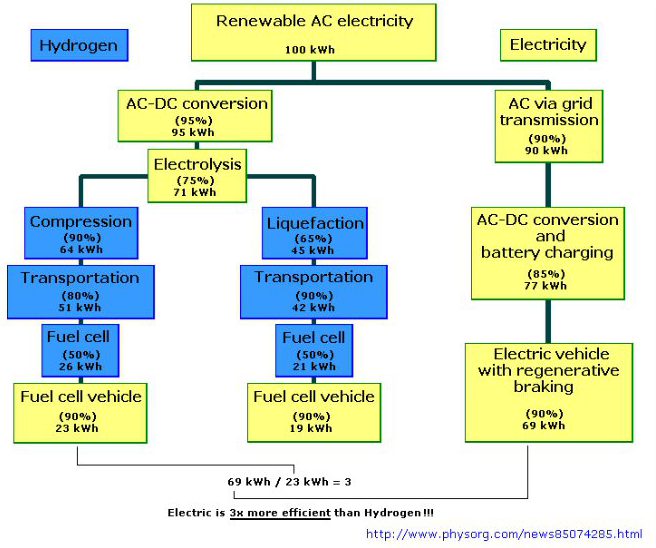Study confirms what common sense has made clear for years: Hydrogen fuel cells cannot catch up to battery-electric vehicles
A new study released in the peer-reviewed journal Mother nature has confirmed what typical feeling has created crystal clear for decades: hydrogen fuel cell automobiles aren’t likely to catch up to battery-electric motor vehicles – even for professional vehicles.
The vehicle sector has been divided on solutions to remove emissions from their products and solutions.
Most have been betting on battery-electric autos(BEV), but a couple of automakers have insisted on striving to make fuel mobile hydrogen powertrains get the job done.
Toyota, Hyundai, and GM have been the most resistant in providing up on the know-how, which also can attain zero-emission transport, but it is much much less productive than BEVs.
For passenger automobiles, it is now match around for gas cells (FCEV).
Some of the largest FCEV systems in the globe, like the Toyota Mirai and Hyundai Nexo, have unsuccessful to gain any reactions just after a long time and billions invested in them.
Apart from the full energy cycle of FCEVs currently being so a great deal considerably less economical (three instances fewer successful, as revealed in the chart under), the infrastructure seems to be the major difficulty.

The two BEVs and FCEVs have infrastructure difficulties, but BEVs have the wonderful advantage of obtaining to establish on an by now in depth electric powered grid infrastructure with just about each individual electric powered outlet in the planet being a likely charging station.
The only challenge is to create a lot more typical quickly-charging stations, which is not a compact problem, but it is continue to a lot much easier than constructing an full hydrogen manufacturing, transportation, storage, and distribution marketplace.
Also, most EV charging is done at dwelling overnight, which is not the circumstance for hydrogen fuel mobile automobiles.
In which FCEVs still experienced a prospect was with business vans, but now a new analyze even throws some chilly h2o on that.
A new study from Patrick Plötz at the Fraunhofer Institute for Techniques and Innovation Study ISI, Karlsruhe, Germany printed a new research in Character.
Titled ‘Hydrogen technological know-how is unlikely to enjoy a main role in sustainable street transportation,’ the research employs information to exhibit that hydrogen fuel cell motor vehicles are not most likely to ever catch up to battery-electric cars:
“Technical and financial developments in battery and quickly-charging technologies could before long make fuel mobile electric cars, which operate on hydrogen, superfluous in road transportation.”
The analyze points to even business vans not becoming probably to give gas mobile powertrains a probability in the extended phrase:
“The present challenge for battery-electric autos is extended-haul logistic procedure (with an regular of 100,000 km for every year) and transportation of extremely hefty goods (which indicates higher electrical power usage for each kilometer). This is the use case typically discussed for hydrogen trucks. Various truck brands, as very well as fuel mobile and infrastructure providers, have joined forces and introduced a concentrate on of 100,000 fuel-mobile trucks on European roads by 2030. But this seems quite not likely when contrasted with bulletins from the businesses about the earliest get started day for the generation of industrial sequence gasoline mobile electrical vans remaining in 2027. By that time, the second-era battery-electric powered motor vehicles will by now be commercially accessible and in operation.”
Some truck makers, like Nikola Motors, claim that they will have production FCEV semi-trucks out there faster than in 2027 (2023-24), but even it has bit by bit been shifting toward battery-electric powered autos.
The corporation first began as a natural gas truck organization, then it transitioned to fuel mobile hydrogen motor vehicles, then a mix of fuel mobile hydrogen and battery-electrical, and right now the company’s 1st truck to market place is a battery-electrical truck – decades ahead of its FCEV systems.
The study notes that with the new megawatt charging standard for battery-electric vans and improvements in battery technologies, the up coming generation of electrical vans is probable to depart gasoline cell hydrogen vehicles powering.
Do you imagine gas cell hydrogen has any chance of achievements? Allow us know in the comment area below.
FTC: We use profits earning vehicle affiliate hyperlinks. Additional.
Subscribe to Electrek on YouTube for special films and subscribe to the podcast.